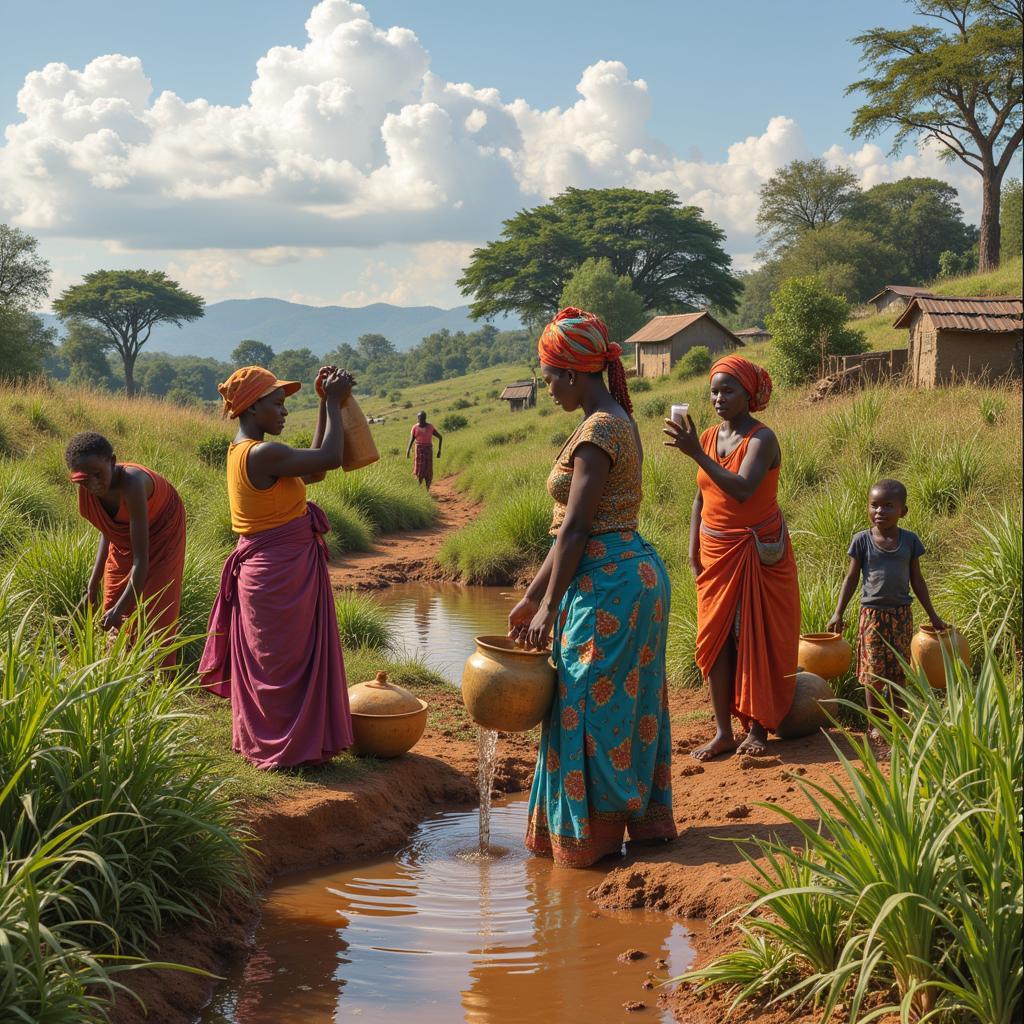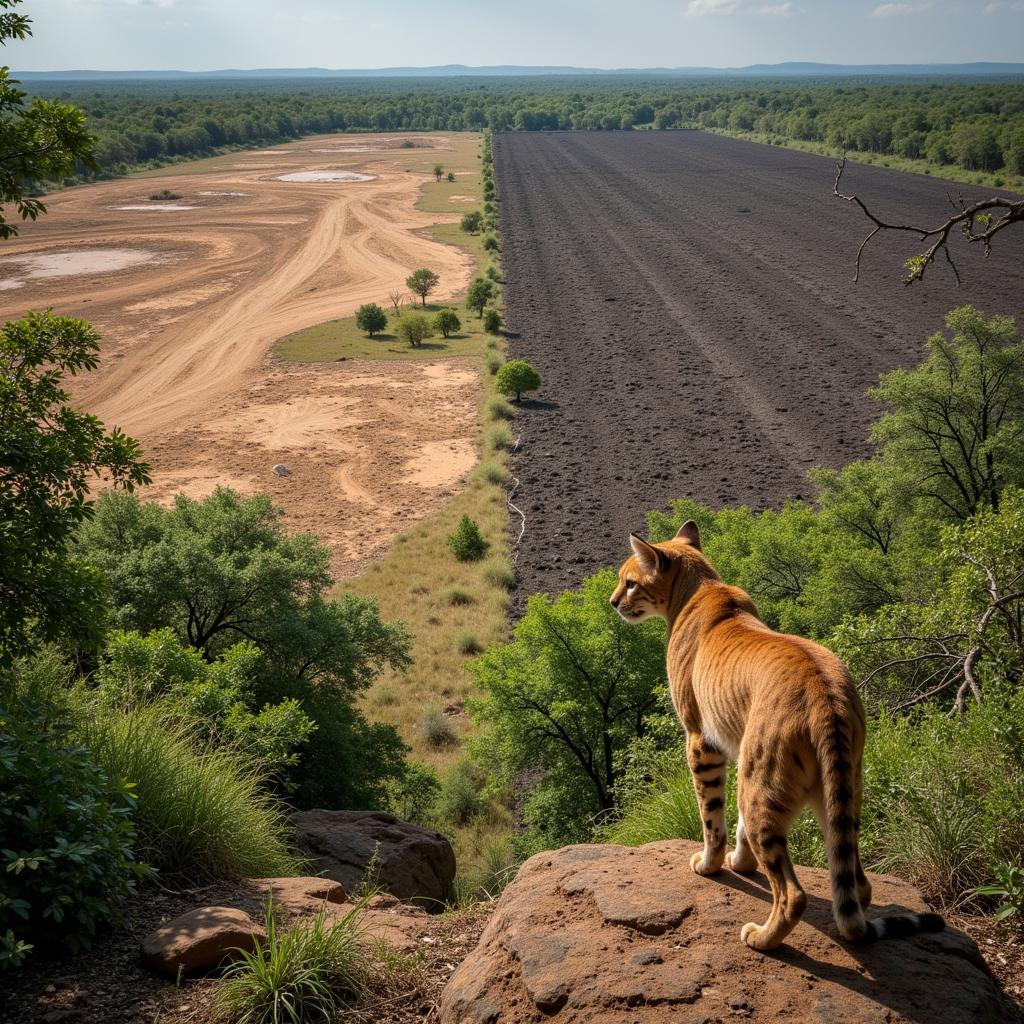Majestic African Desert Lion: King of the Harsh Landscapes
The African Desert Lion, a symbol of strength and resilience, roams the arid landscapes of southwestern Africa, facing unique challenges and exhibiting remarkable adaptations. These magnificent creatures, slightly smaller than their savannah counterparts, have carved a niche in some of the harshest environments on Earth. Their story is one of survival, adaptation, and a constant battle against the odds.
Living in a desert environment presents significant challenges for any large predator. Limited prey availability and scarce water sources are constant concerns. However, the African desert lion has evolved specific adaptations to thrive in these harsh conditions. For example, their lighter coat color helps them blend into the desert landscape, providing camouflage while stalking prey. Shortly after this introduction, we’ll dive deeper into these remarkable adaptations. Did you know that they can even obtain water from the flesh of their prey? This ability is crucial for their survival in the arid desert.
Adapting to the Harsh Desert Life
African desert lions exhibit several key adaptations that allow them to survive in their challenging environment. Their ability to conserve water is paramount. They can go for extended periods without drinking, obtaining moisture primarily from their prey. Their physical characteristics also play a vital role. Their smaller size and leaner build, compared to savannah lions, help them regulate body temperature in extreme heat. Moreover, their larger paws distribute their weight effectively on the soft sand, allowing them to move efficiently across the challenging terrain.
The social structure of African desert lions also differs from that of their savannah relatives. They typically live in smaller prides, reflecting the lower prey density in the desert. This smaller pride size allows them to maximize their limited resources and reduce competition within the group.
These remarkable adaptations showcase the African desert lion’s resilience and ability to thrive in one of the world’s most demanding ecosystems.
What Do African Desert Lions Eat?
The diet of the African desert lion consists primarily of larger ungulates such as oryx, gemsbok, and springbok. They also opportunistically prey on smaller animals like rodents and reptiles. Their hunting strategies are adapted to the open desert terrain, often involving long stalks and ambushes, utilizing the landscape to their advantage.
The African indigenous plants in their habitat also play an indirect role in their survival by supporting the herbivores that constitute their prey base. Understanding the delicate balance of this desert ecosystem is crucial to ensuring the continued survival of this majestic predator.
While the African desert lion primarily focuses on larger prey, it exhibits dietary flexibility, consuming smaller animals when necessary. This adaptability is a testament to its resourcefulness in the face of scarce food sources. Learn more about african animal o. What does this tell us about their survival strategies? It demonstrates their remarkable capacity to adapt and thrive in a harsh and unpredictable environment.
Conservation Efforts and Challenges
The African desert lion faces numerous threats, including habitat loss due to human encroachment, conflict with local communities, and the impact of climate change. Conservation efforts are crucial to protect these magnificent animals and ensure their long-term survival. These efforts include community-based conservation programs, anti-poaching patrols, and research initiatives to better understand their behavior and ecology.
One of the key challenges in conserving African desert lions is balancing the needs of local communities with the protection of these predators. Finding sustainable solutions that benefit both humans and wildlife is paramount to the success of these conservation efforts. Learn more about african domestic animals.
The Future of the African Desert Lion
The future of the African desert lion remains uncertain, but with continued conservation efforts and a growing awareness of their plight, there is hope for their long-term survival. Protecting their habitat, mitigating human-wildlife conflict, and addressing the impacts of climate change are essential steps in securing their future.
Dr. Zara Hassan, a prominent wildlife biologist specializing in African carnivores, emphasizes the importance of collaborative conservation: “Protecting the African desert lion requires a multifaceted approach, involving local communities, governments, and international organizations working together to ensure the survival of this iconic species.”
Conclusion
The African desert lion stands as a testament to the power of adaptation and resilience in the face of adversity. Protecting this magnificent creature and its fragile desert ecosystem is a crucial task, demanding collaborative effort and a commitment to ensuring that the king of the desert continues to reign for generations to come. Learn about aardwolf african mammals. Remember, the future of the African desert lion is in our hands.
FAQ
- What is the biggest threat to African desert lions? Habitat loss and human-wildlife conflict.
- How do African desert lions survive without regular access to water? They obtain moisture primarily from their prey.
- How big are African desert lion prides? They generally live in smaller prides compared to savannah lions.
- What do African desert lions eat? Mainly large ungulates like oryx, gemsbok, and springbok.
- What is being done to conserve African desert lions? Conservation efforts include community programs, anti-poaching patrols, and research initiatives.
- How does climate change affect African desert lions? It exacerbates the challenges they already face, such as water scarcity and prey availability.
- Where are African desert lions found? They inhabit the arid landscapes of southwestern Africa.
You might also be interested in learning more about african countries south to north.
Need more information or have a question? Please contact us:
Phone: +255768904061
Email: kaka.mag@gmail.com
Address: Mbarali DC Mawindi, Kangaga, Tanzania.
Our customer service team is available 24/7.





